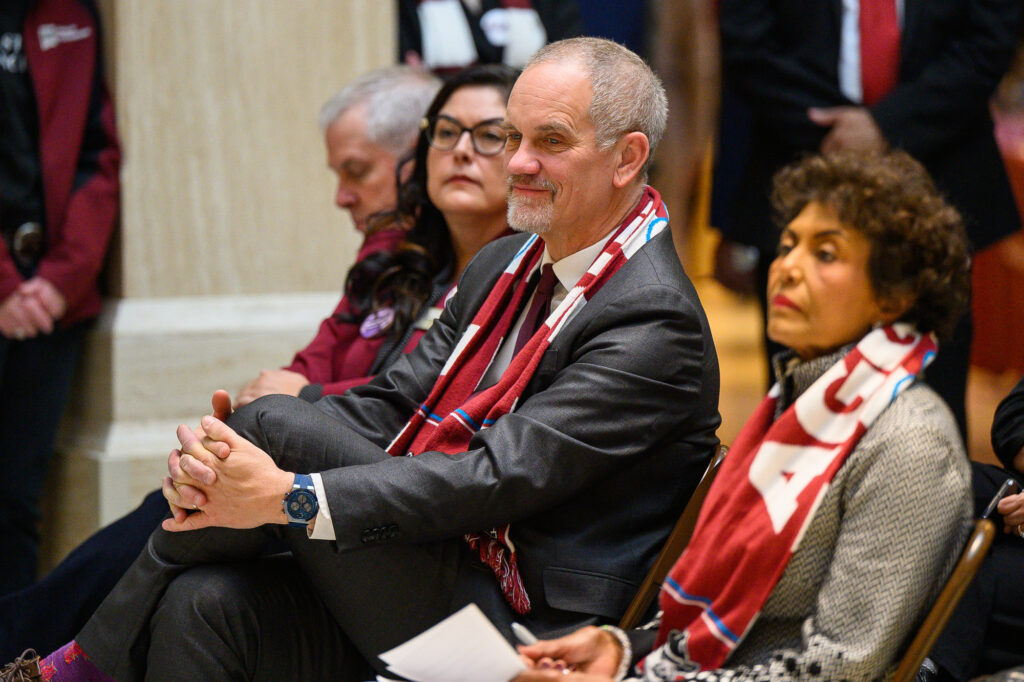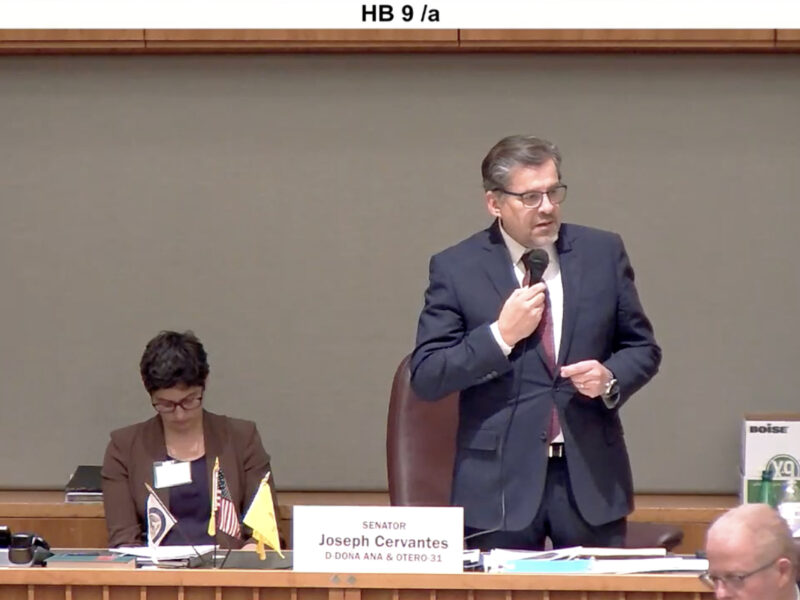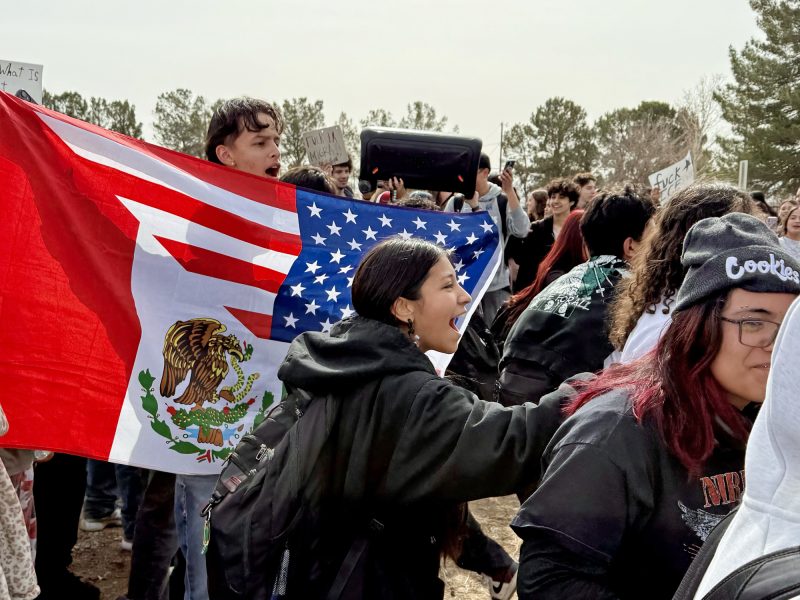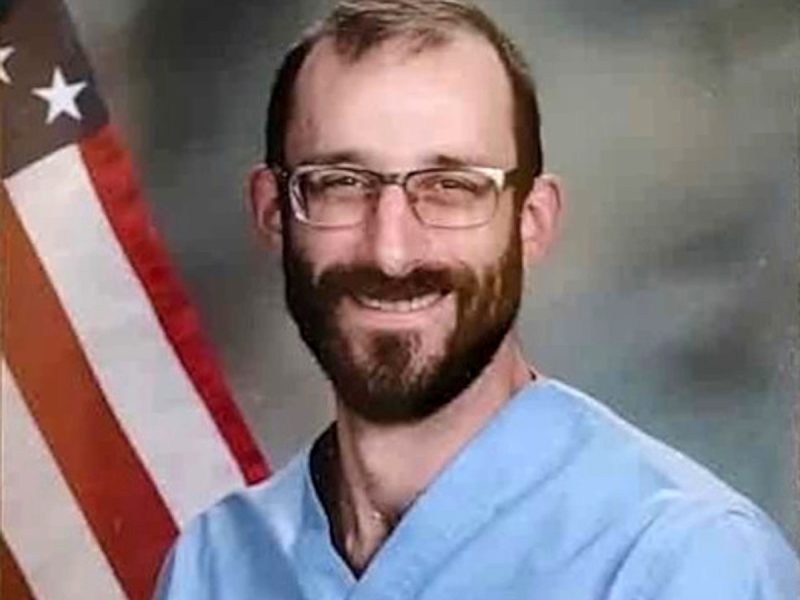
New Mexico State University’s new president is taking a measured but firm approach to dealing with the damage caused by the Trump Administration.
Valerio Ferme was hired in September to steer NMSU into the future. The university was in desperate need of stability and leadership after scandal shook the university to its core. The controversies included a men’s basketball coach being fired and the season cancelled because of a fatal shooting while the team was on the road and a sexual assault and hazing scandal.
In between Ferme’s hiring and his start date of Jan. 1, Donald Trump was elected U.S. president. Shortly after Ferme took office, Trump was sworn in and began taking a hatchet to government at all levels.
Ferme mentioned the chaos that created for NMSU’s research funding, diversity programs and immigrant population in his first newsletter address to the community on Jan. 29.
“These actions have wrought significant havoc in the lives of the people we employ, teach and serve throughout the state,” Ferme wrote.
He reiterated NMSU’s commitment as a land-grant and minority-serving university “to serve the diverse needs of our state and its sovereign nations.” He announced the creation of a website to provide information on “the disparate measures and outcomes” that impact the university. And he shared guidance the state’s Department of Justice released related to immigration.
‘An opportunity to expand inclusivity’
Almost a month later Ferme wrote again, saying language in Trump’s order to end diversity, equity and inclusion programs and efforts in the federal government also protected First Amendment rights. That meant, he advised, that faculty could “continue to teach and do research in fields of knowledge that are ‘controversial’ per the executive order.”
He urged the continuance of programs that bring people together, “whether in urban centers or rural outposts, whether through the eyes and bodies of veterans and migrant children seeking to elevate their fortunes, or the sovereign, ancestral cultures of the people of the land and the enchanted wonder of newcomers to its communities.”
“Please use this changing scenario as an opportunity to expand inclusivity to new members and perspectives,” he wrote.
The university went ahead with its second annual “Justice and Revolutionary Thought Conference,” hosted by the NMSU Office of Equity, Inclusion and Diversity, on March 26. It was a collaboration between NMSU’s Black Programs, Latin American Programs, American Indian Programs, LGBT+ Programs and the Asian Pacific Islander Program.
The conference featured “original scholarship, art, multimedia and panels that promote activism, social change and dissent,” a news release announcing the conference stated. Topics included “cultural studies, community building, gender and sexuality, wellness and health care, race and justice in uncertain times.”
Ferme showed up with a more emotional tone in a message on March 20, urging folks in the NMSU community to “see each other, our students, our colleagues with openness, rather than characters in an us-vs.-them world.”
“We live in a chaotic, unpredictable and changing world,” he wrote. “Throughout the challenges we face, I hope we can look to each other for support, grace, and gratitude, and continue to be proud in how we contribute to make NMSU’s mission a life-changing one.”
‘Unprecedented challenges’
The work didn’t stop there. Ferme shared in an April 4 letter that he had convened a task force of faculty, staff and administrators to study the impact of the more than 200 orders and directives from the new federal administration and “devise a pathway forward.”
The university president’s strongest statements came in his most recent communication on April 17. He acknowledged the “true disruption” the past weeks brought to people in the NMSU community. He spoke about “unprecedented challenges” to research and other work. He mentioned that some folks “now must address the anxiety of orders that challenge their security and feelings of permanence in our community.”
Ferme shared some news: While the federal government had revoked the visas issued to a handful of international NMSU students, those were due to “infractions related to current law or outdated records, not protests or social media posts,” he wrote. That’s noteworthy because the Trump Administration has revoked the visas of some students at high-profile universities, apparently for exercising their free-speech rights.
Ferme praised faculty and staff who are “selflessly, quietly, and through their dedication to our educational mission” helping those NMSU students who had visas revoked finish their studies.
He said by law NMSU “cannot provide direct legal assistance to those affected” but has hired an international law agency and will hold public forums in the near future “in which our legal experts will provide the best and up-to-date information on this developing crisis.”
He also shared information about NMSU’s involvement in legal challenges to funding cuts for research.
‘Tangible actions on behalf of those most affected’
I’m impressed. Ferme has remained calm and focused but he hasn’t shied away from the disruption and pain Trump is inflicting on members of the NMSU community.
I have watched the university as a journalist since 1998, when I got my first reporting job at the university’s student newspaper, The Round Up. Over the years, NMSU’s administration has often been slow to stand up for what’s right.
I see the opposite happening now.
There will always be folks who want more — more direct challenges to the Trump Administration, stronger defenses of students and researchers. Ferme addressed those people in his most recent message, writing that “bold statements might do more harm and damage to more members of the entire system.”
“Conversely, our tangible actions on behalf of those most affected can help succeed in preserving the wellbeing of the broader community,” Ferme wrote. He pledged that NMSU would continue to protect “the educational mission of freedom of inquiry” and support those who were most dependent “on federal and state moneys to advance their wellbeing in life.”
In short, NMSU’s equity efforts continue. The university is working to support those international students who have had their visas revoked. And it’s challenging funding cuts to research.
That’s substantial, especially for a university that’s in a rebuilding phase.
Recognizing good work
It’s probably not surprising, giving Ferme’s background. As the dean of the College of Arts and Sciences at the University of Cincinnati, he created an associate dean post in 2020 focused on building inclusion-focused initiatives around student success, hiring and instruction and implementing policies that “establish the college as a leader in equity at the university,” according to that school’s website.
Before that, according to an NMSU news release, Ferme worked to increase “underrepresented faculty hires” in his time at Northern Arizona University and collaborations with the surrounding city of Flagstaff and nearby Native communities.
And at the University of Colorado, Ferme received an award from that school’s Office of Diversity, Equity and Community Engagement for his work, which included focusing on support for underrepresented minorities.
Universities with less money and influence than Harvard are in a tough spot right now. It’s sometimes difficult to know how best to respond to Trump’s assaults. NMSU is working to thread a needle, protecting community members and programs that support them without picking a fight it cannot win. In doing so, the university is being bolder than it often has in the past.
Ferme may need pushed to be even bolder at times. I also think we all should recognize the good work he’s done thus far.



Sounds like he might be the right leader for the moment.
I think so.
Very nice to read about these efforts. Keep reporting updates about these important challenges to higher ed.
Will do!